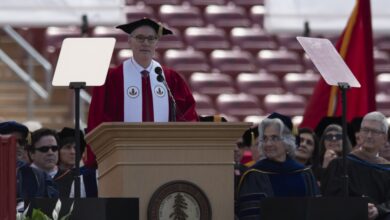Yale and National U. of Singapore Announce End of Prominent Joint Liberal-Arts College

Yale University and the National University of Singapore will end their pathbreaking joint college, an effort to reimagine the liberal arts in an Asian and global context, the universities announced late Thursday.
Instead, Yale-NUS College, as it’s known, will be merged into a new, interdisciplinary honors college in 2025 that is part of the National University of Singapore, part of a broader campus reorganization. This year’s freshman class will be the last to receive a Yale-NUS degree.
Despite the publicly amicable uncoupling, the decision to dissolve such a prominent experiment in cross-border education is likely to invite new scrutiny of international campuses and global partnerships.
Yale will continue to advise in the development of the provisionally named New College, but it will relinquish its governance role. No new classes of students will be admitted to Yale-NUS.
In an interview, Pericles Lewis, Yale’s vice president for global strategy and Yale-NUS’s inaugural president, said a review in 2025 of the partnership had been built into the initial agreement, signed in 2011. It was NUS’s decision to end the joint liberal-arts college in Singapore, and to absorb it into an honors college, a step Lewis called “bittersweet.”
Lewis said Yale-NUS’s impact had been “extremely positive,” noting that it had led to a reconsideration of the nature of a liberal-arts education in both Asia and the United States. “We think there’s a lot of success we can build on,” he said. Over the years, some 200 Yale professors have spent time teaching at Yale-NUS.
Even though the honors college “will not have the Yale name, a great legacy lives on,” Lewis said.
In a news release, Tan Eng Chye, NUS’s president, said the university would absorb lessons from Yale-NUS, which enrolled its first students in 2013, into its New College. “A world-class university education must evolve quickly to prepare students for a world marked by ever-greater volatility, uncertainty, complexity, and ambiguity,” he said.
Because the decision to withdraw from the partnership was announced four years in advance, all current Yale-NUS students will have a chance to complete their studies. From the start, Yale-NUS degrees have been awarded by NUS — in contrast to some other liberal-arts partnerships, such as New York University’s campus in Shanghai, in which students receive a separate American degree.
Tenured faculty members will retain their positions at NUS, although not necessarily in the honors college, and those on the tenure track will remain under consideration for promotion. Staff jobs will also be retained, Lewis said.
The Yale-NUS marriage was long viewed with suspicion by some Yale faculty members, who worried it could divert institutional resources and who questioned whether the university should be so heavily engaged in a country without the same protections for free speech and nondiscrimination. In 2012, Yale’s arts and sciences faculty passed a resolution expressing “concern” with the partnership.
The seeds of the joint college were planted at a meeting of the World Economic Forum, in Davos, Switzerland, between the then presidents of Yale and NUS, both of whom have since stepped down. Lewis left Singapore and returned to Yale in 2017.
Yale-NUS’s end comes at what could be an existential moment for American education’s international engagement, as colleges assess what comes after the Covid-19 pandemic all but shut down global academic mobility.
Kevin Kinser, head of education-policy studies at Pennsylvania State University, researches international branch campuses. He and his colleagues have noted challenges in sustaining high-level international agreements past the initial set of leaders.
Still, Kinser said he was “flummoxed” by the Yale-NUS announcement. “Yale is a big name to give up,” he said. “To give up Yale as a partner, that’s a pretty big deal.”
Source link






